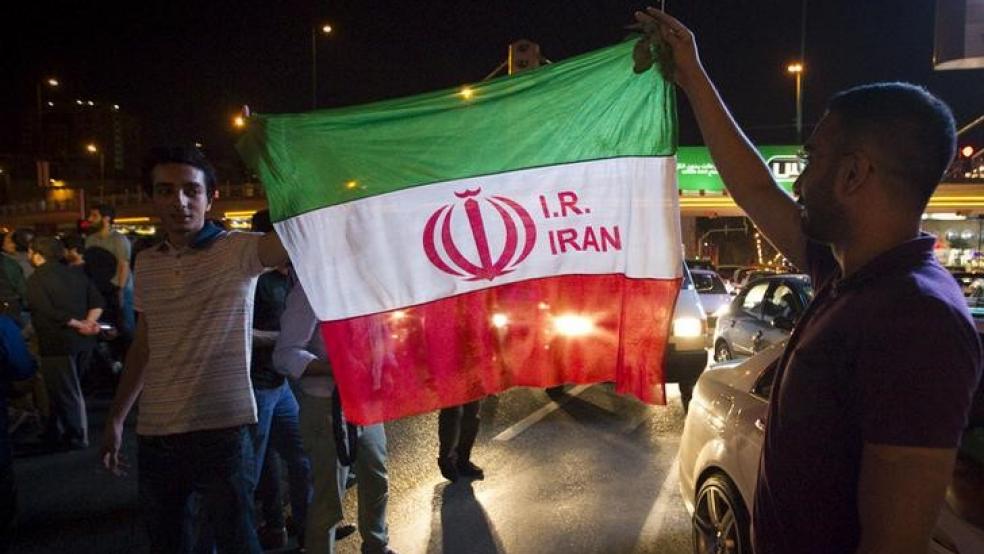With passage of the Iran nuclear deal assured, reaction among lawmakers on Tuesday was marked by searing and emotional rhetoric.
“This is a terrible deal. When somebody says they want to cut your throat, the last thing you should do is buy them a knife,” Lindsey Graham told CNN. “In fifteen years, they’re going to have a nuclear device, even if they don’t cheat with a missile to deliver it.”
Related: Iran Nuclear Deal Looks Like a Lock as Mikulski Announces Her Support
“We might as well write the check to Assad, Hezbollah and Hamas because that’s where the money’s going to go,” Graham said. “This guy [the Ayatollah] is a religious Nazi, and he will, over time, use every weapon he develops or buys against us and Israel.”
“We’re going to try to get 60 votes to disapprove this deal,” he added.
Only days after President Obama amassed Democratic firewall to sustain his veto and ensure the agreement would not fail, Democrats announced that they now have enough votes for a filibuster that could prevent debate and stop McConnell from bringing the agreement up for a final vote.
Now, with 41 Democratic senators on board, the Senate GOP leadership will be unable to muster the 60 votes needed for cloture to cut off a debate and move to a final vote.
The Republican controlled House is expected to approve a resolution of disapproval later this week and send it to the Senate for concurrence. But assuming all the Senate Democrats hang together, the nation will be treated to the spectacle of unfettered rhetoric but no meaningful action. And even before the debate heats up on the Senate floor, many Republicans are voicing frustration and outrage over the situation.
Former Republican Vice President Dick Cheney described the Obama administration’s agreement with Iran to curb its nuclear weapons program for 15 years in exchange for the lifting of economic sanctions as “madness” and said it should be blocked.
Related: Trump and Cruz, the Bad Boy of the Senate, Put GOP Leaders on Notice
“I know of no nation in history that has agreed to guarantee that the means of its own destruction will be in the hands of another nation, particularly one that is hostile,” Cheney declared during a speech this morning to the American Enterprise Institute. “Arming and funding Iran while simultaneously providing them a pathway to nuclear arsenal is not an act of peace. It’s not, as President Obama claims, the only alternative to war. It is madness.”
Senate Minority Leader Harry Reid (D-NV), by contrast, told the Carnegie Endowment for international Peace that “This agreement will stand” and that “America will uphold its commitment and we will seize this opportunity to stop Iran from getting a nuclear weapon."
Meanwhile, Republican presidential frontrunner Donald Trump and Sen. Ted Cruz (R-TX), another White House contender, are taking their fight against Obama’s signature foreign policy achievement to a mass rally on the West Front of the Capitol.
Related: Obama’s Iran Deal Picks Up Some Surprising Support
While Democratic Sen. Joe Manchin of West Virginia delivered an early morning disappointment to the administration by announcing that he would join with the Republicans and a few Democrats to oppose the nuclear non-proliferation deal, three other previously undecided Democrats came forward to say they would support the agreement. The trio includes Sens. Richard Blumenthal of Connecticut, Ron Wyden of Oregon and Gary Peters of Michigan.
Related: Why GOP Opposition to the Iran Nuclear Deal Fizzled Out
"The fundamental question for me is what this agreement means for the prospects of Iran getting a nuclear bomb," Wyden said, according to the Associated Press. "This agreement with the duplicitous and untrustworthy Iranian regime falls short of what I had envisioned. However, I have decided the alternatives are even more dangerous."
Sen. Lindsey Graham (R-SC) urged two more Democrats to join the united GOP bloc and members of their own party who have come out against deal to help get over the 60-vote procedural hurdle to start debate on the agreement.
A bipartisan deal worked out early this year gave Congress the authority to review and reject the final nuclear deal if it chooses. As written, the law gave congress up to 60 days to review the details of the agreement and then introduce a resolution of approval or disapproval.
That left Obama with the option of vetoing the resolution – and making it stick if he could round up at least 34 votes to prevent a two-thirds override in the Senate. It also left open the possibility – not seen as likely at the time – that the Democrats could actually filibuster the resolution—and keep it from ever being brought up.
Related: Facing Defeat on Iran Nuclear Deal, Republicans Ponder Plan B
McConnell said every senator who voted for the compromise procedural measure should have a chance to vote on the final resolution.
“Along with the Americans we were sent here to represent, countries, businesses, and proliferation networks seeking to expand ties with Iran stand to have simple question answered: Does the Senate disapprove of this deal with Iran? The Senate should not hide behind procedural obfuscation to shield the President or our individual views,” he said on the Senate floor.
For its part, the administration on Tuesday signaled it would welcome a filibuster of the resolution to disapprove the nuclear bargain.
“We certainly would expect those members of Congress who support the agreement to take the necessary steps in Congress to prevent Congress from undermining the agreement,” said White House press secretary Josh Earnest.
He later said, “It does appear that as the days go by there's less and less drama associated with the Iran vote.”






